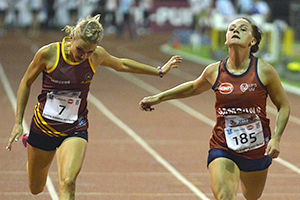
Elmé Smith represented Kovsies in the 100 m
and 200 m at the Varsity athletics event in
Potchefstroom.
Photo: Mario van de Wall/SASPA
Jovan van Vuuren, Maryke Brits, and Tsepang Sello were our big stars at the first Varsity athletics event in Potchefstroom. They all finished first in their items and helped their Kovsies team claim an excellent overall third position among eight universities.
The jumps by Van Vuuren and Brits (both long jump) of 7.73 m and 6.11 m respectively were the longest, while Sello’s time in the 800 m was 2:12.01. Brits not only won the long jump, but was also second in the 100 m hurdles (13.65 s).
UFS outperform the likes of Maties, UJ
The Kovsies eventually bragged with three first, seven second, and two third spots on the podium. They ran, jumped and threw, bagging altogether 12 podium spots to accumulate 14 902 points (with an average of 993). Tuks, with 15 604 (1 040), and Pukke with 15 252 (1 017) was respectively first and second on 3 March 2017. Our team outperformed universities like the Maties and the University of Johannesburg.
Rynardt, Kesa claim second place
Big names such as Rynardt van Rensburg (800 m, second in 1:50.49) and Kesa Molotsane (1 500 m, second in 04:29.31) also scored podium spots. The second Varsity athletics meeting will take place in Pretoria on 31 March 2017.
Team results in Potch:
1. Tuks 15 604 (Top 15’s average: 1 040)
2. Puk 15 252 (1 017)
3. Kovsies 14 902 (993)
4. UJ 14857 (990)
5. Maties 14317 (954)
6. UWC 14068 (938)
7. Madibaz 13721 (915)
8. TUT 13463 (898)